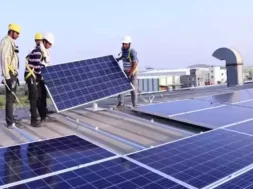
The Tamil Nadu government is set to explore large-scale green energy storage options, reflecting its commitment to advancing renewable energy infrastructure and sustainable power solutions
In Short : The Tamil Nadu government is set to explore large-scale green energy storage options, indicating a proactive approach towards enhancing energy sustainability. By investing in energy storage technologies, the state can efficiently manage renewable energy fluctuations, ensure a stable power supply, and reduce dependence on non-renewable sources. This initiative aligns with Tamil Nadu’s commitment to fostering a green energy ecosystem, contributing to environmental conservation, and promoting sustainable energy practices.
In Detail : Tamil Nadu is exploring a hybrid storage model, in which pumped storage power plants (PSP) will be used to store excess energy from solar, wind, and other sources
The Government of Tamil Nadu is considering options for storing green energy during peak generation seasons to use it during lean periods. Currently, no state in India has a comprehensive strategy for storing green energy and ensuring round-the-clock renewable energy (RE) supply.
Tamil Nadu contributes 26 per cent of the wind power generation, 10 per cent of solar generation, and a total of 14 per cent to India’s overall RE generation capacity.
According to sources, the state’s Industries Minister, T R B Rajaa, has informed District Collectors that green energy storage is a significant focus for Tamil Nadu, addressing a meeting on Tuesday.
This comes weeks after the Ministry of Power released a detailed framework to reshape the country’s energy sector, with a special emphasis on energy storage systems. Based on the plan, the central government may offer viability gap funding support for battery energy storage system projects, covering up to 40 per cent of the initial capital expenses of these projects.
Tamil Nadu is exploring a hybrid storage model in which pumped storage plants (PSPs) will be used to store excess energy from solar, wind, and other sources during periods of high demand, said sources.
An industry executive noted, “Wind and solar power are seasonal. Hence, this strategy will be advantageous for a state like Tamil Nadu.”
PSPs operate similarly to giant water batteries, storing power and releasing it when needed. This approach is cost-effective compared to various battery technologies that use different electrochemical reactions to store electricity, such as lead-acid batteries, lithium-ion (Li-ion) batteries, sodium-sulphur batteries (NaS), flow batteries, zinc-air batteries, and supercapacitors.
“The seasonality of these sources is disproportionate to consumption patterns, which essentially calls for sustainable storage infrastructure. In the case of Tamil Nadu, over 30 per cent of the demand is met by RE sources. While there is potential for expansion, grid balancing during peak demand, along with seasonality, makes a strong case for storage. Building storage infrastructure requires significant investment and technology,” said Alex T Koshy, director of India entry advisory services at SAS Partners, a corporate advisory firm facilitating foreign investments in India.
While conventional energy sources like coal, gas, and nuclear power can be stockpiled and generation can be controlled, this is not possible with seasonal RE sources. The storage of this power will help improve grid stability, considering the country’s aggressive approach to RE capacity additions.
The country’s RE capacity is expected to reach 280 gigawatt (Gw) by 2025, contributing to approximately 37 per cent of the total energy supply.
According to the Central Electricity Authority (CEA), the present installed capacity of PSPs in the country is 4.7 Gw, with another 1.5 Gw under active construction. This is in comparison to 36 Gw in China and 22 Gw each in the US and Japan.
Large-scale energy storage-based RE projects are yet to be built in the country. Several companies, including state-owned NHPC, have plans to use PSPs to store green energy.
The step by Tamil Nadu is also significant given the surplus RE generation in the state but an acute lack of interstate transmission system to evacuate it to other states.
Tamil Nadu Generation and Distribution Corporation recently urged the Centre to conduct a state-wise analysis of transmission systems required by RE-rich states and connectivity possibilities with the ones that would require this RE power.
According to the CEA’s monthly report in August, of the 131 Gw of RE installed capacity in India, 18 Gw is in Tamil Nadu.
Of the total 11,557 million units of wind power generated in June, Tamil Nadu contributed around 3,049 million units.
Similarly, of 9,607 million units of solar power generated during that month, the state’s contribution was 969 million units.












